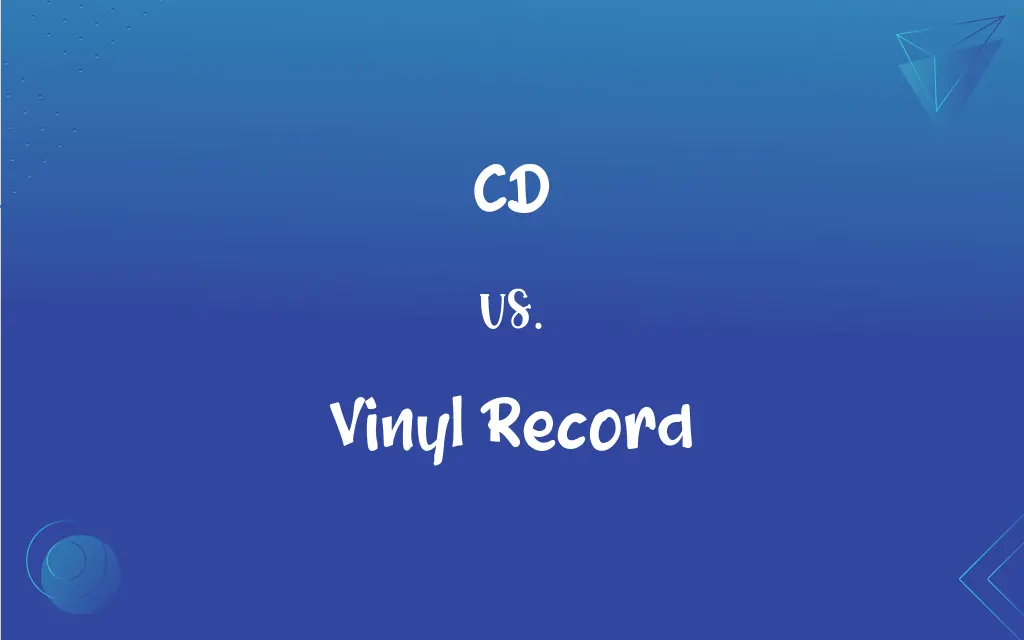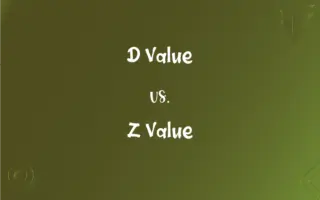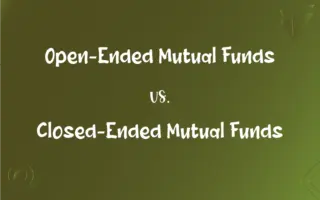CD vs. Vinyl Record: What's the Difference?
Edited by Aimie Carlson || By Janet White || Published on August 19, 2024
CDs are digital audio storage mediums with a higher sound clarity, while vinyl records are analog and often praised for their warm, rich sound quality.

Key Differences
CDs (Compact Discs) represent digital audio technology, offering clear, precise sound reproduction without the background noise typically associated with vinyl records. CDs became popular for their convenience, portability, and ability to store music in a compact format. In contrast, vinyl records, with their analog nature, are often celebrated for their warmer, more authentic sound. This distinction between digital clarity and analog warmth is a key point of debate among audiophiles.
Vinyl records offer a tactile listening experience, with listeners valuing the ritual of handling and playing a record as much as the audio quality. The artwork and physical presence of vinyl records add to their appeal. CDs, while less visually impactful, provided a more practical and durable way to enjoy music, leading to their dominance in the music industry through the late 20th and early 21st centuries.
The production process of vinyl records and CDs differs significantly. Vinyl records are pressed from master recordings, giving them a unique sound that many argue cannot be replicated by CDs' laser-read digital files. This process contributes to the distinct audio character of vinyl, which some listeners prefer over the perfectly replicated sounds of CDs.
In terms of durability, CDs are more susceptible to damage from scratches, which can affect playback quality. However, they are easier to store and less vulnerable to environmental factors than vinyl records, which can warp or degrade over time if not properly cared for. This difference in maintenance and longevity is a consideration for collectors and music enthusiasts.
The resurgence of vinyl records in recent years highlights a nostalgic appreciation for the format's aesthetic and auditory experience, despite the practical advantages of CDs. This revival speaks to a desire for a more immersive and engaging listening experience, contrasting with the convenience and efficiency of CDs.
ADVERTISEMENT
Comparison Chart
Medium
Digital
Analog
Sound Quality
Clear, precise
Warm, rich
Storage Capacity
Up to 700MB or 80 minutes of audio
Limited by physical size, usually 40-45 minutes per side
Durability
Susceptible to scratches, but compact and easy to store
Can warp or degrade, requires careful handling
Listener Experience
Convenient, portable
Tactile, nostalgic
ADVERTISEMENT
CD and Vinyl Record Definitions
CD
Can hold approximately 700MB of data or about 80 minutes of audio.
I filled my CD to its capacity with songs for the road trip.
Vinyl Record
Experiencing a resurgence in popularity due to its tactile and nostalgic appeal.
The comeback of the vinyl record is a testament to its timeless appeal.
CD
A compact disc used to store digital data, including audio, video, and computer files.
I burned my favorite playlist onto a CD to play in my car.
Vinyl Record
Known for its warm, rich sound quality that many audiophiles prefer.
The sound of a vinyl record has a warmth that digital formats can't replicate.
CD
Represents a significant evolution in music technology, allowing for portable, high-quality sound.
The CD changed the way we listened to music, making it possible to skip tracks instantly.
Vinyl Record
Collectible items that often include unique artwork and packaging.
The artwork on vinyl record sleeves is as much a part of the experience as the music.
CD
Susceptible to physical damage, which can affect playback.
My old CD skips because it's scratched from being handled so much.
Vinyl Record
An analog sound storage medium consisting of a flat disc with an inscribed, modulated spiral groove.
I found a vintage vinyl record at the flea market and couldn't wait to play it.
CD
Became the dominant format for music distribution before digital downloads.
The 90s were the golden age of CDs, with albums selling millions of copies.
Vinyl Record
Requires specific playback equipment, like a turntable, for listening.
My turntable is the centerpiece of my living room, ready for any vinyl record.
CD
The chemical suymbol for cadmium, a metallic element of atomic number 48.
CD
The abbreviation for the candela, the basic unit of luminous intensity adopted under the System International d'Unites.
FAQs
What is a vinyl record?
A vinyl record is an analog sound storage medium, featuring a flat disc with a modulated spiral groove.
How does the sound quality of CDs compare to vinyl records?
CDs offer clear, precise sound quality, while vinyl records provide a warmer, richer listening experience.
Can the artwork of CDs and vinyl records differ in appeal?
Vinyl records often feature larger, more detailed artwork, adding to their collectible appeal compared to CDs.
What is a CD?
A CD (Compact Disc) is a digital optical disc used to store audio, video, and data.
Can vinyl records hold as much music as CDs?
No, vinyl records typically have a shorter playtime, limited by their physical size, compared to CDs.
Are CDs and vinyl records affected by environmental factors?
Vinyl records can warp or degrade with improper storage, while CDs are less affected by environmental factors but can suffer from data rot over time.
What equipment is needed to play a CD and a vinyl record?
A CD player or computer with a CD drive is needed for CDs, while a turntable is required for vinyl records.
How has the popularity of CDs and vinyl records changed over time?
CDs dominated the late 20th and early 21st centuries, but vinyl records have seen a resurgence in popularity for their nostalgic value.
Are CDs more durable than vinyl records?
CDs are more compact and easier to store but can be easily scratched, affecting playback, whereas vinyl records require more careful handling to avoid warping or degradation.
Why do some people prefer vinyl records over CDs?
Some prefer the tactile, nostalgic experience and the unique sound quality of vinyl records.
How are CDs and vinyl records made?
CDs are manufactured through a process of molding and laser-etching digital data, while vinyl records are pressed from a master recording.
What drives the resurgence of vinyl records in the digital age?
A desire for physical media, the unique sound quality, and the nostalgic experience associated with vinyl records drive their resurgence.
What is the maximum audio capacity of a standard CD?
A standard CD can hold up to 700MB of data or approximately 80 minutes of audio.
How do listeners describe the experience of playing vinyl records?
Listeners often describe playing vinyl records as a more engaging and immersive experience.
Can new music be found on vinyl records?
Yes, many new releases and reissues are available on vinyl, catering to the growing demand.
Do vinyl records require special care?
Yes, they should be stored vertically, kept clean, and handled by their edges to prevent damage.
Why are vinyl records considered collectible?
Due to their unique artwork, sound quality, and the tactile experience they offer, making them desirable to collectors.
Is there a difference in price between CDs and vinyl records?
Vinyl records are often more expensive than CDs, due to their manufacturing process and collectible nature.
What is the impact of scratches on CDs and vinyl records?
Scratches can cause CDs to skip or become unreadable, while they can create pops and clicks on vinyl records.
What genres of music are popular on vinyl records?
All genres are popular on vinyl, but rock, jazz, and classical music especially benefit from the format's sound quality.
About Author
Written by
Janet WhiteJanet White has been an esteemed writer and blogger for Difference Wiki. Holding a Master's degree in Science and Medical Journalism from the prestigious Boston University, she has consistently demonstrated her expertise and passion for her field. When she's not immersed in her work, Janet relishes her time exercising, delving into a good book, and cherishing moments with friends and family.
Edited by
Aimie CarlsonAimie Carlson, holding a master's degree in English literature, is a fervent English language enthusiast. She lends her writing talents to Difference Wiki, a prominent website that specializes in comparisons, offering readers insightful analyses that both captivate and inform.






































































